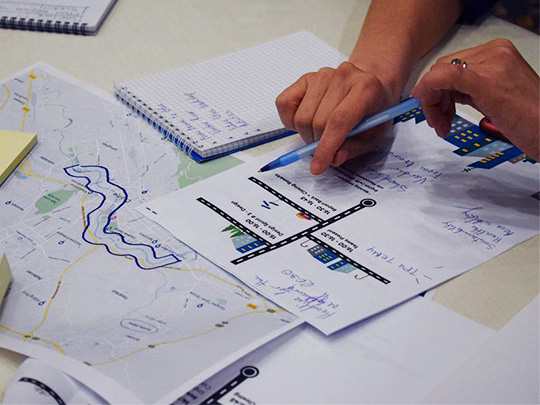1. What is the Technical Documentation Fund?
The Technical Documentation Fund (TDF) is a project-financing structure. It has been developed by UNDP to provide immediate funding to municipalities that are most in need for preparation of technical documentation for their priority development projects. The strategic objective of the TDF is to increase the preparedness and capacity of municipalities to prepare basic and more complex (infrastructure) development projects that will be ready for funding from other sources, such as eligible funds and programs of the EU, the World Bank, EBRD etc.
2. Who can apply?
All 80 municipalities in the Republic of North Macedonia are eligible applicants.
3. Are joint applications allowed?
Yes, two or more municipalities may join in partnership to support a single project and apply with a single application for financing for that project. There is no limit to the maximum number of partners joint behind a single application.
4. How many projects can a single applicant apply with?
Each municipality can submit ONLY ONE application – meaning, if an applicant applies individually then it cannot also apply as part of a partnership, and vice versa.
5. What is the maximum amount of funds that a project can be awarded?
The maximum amount an individual applicant may be awarded is 30,000 USD. In cases of joint applications by two or more municipalities, the maximum award amount would be proportional to the number of partners – i.e. if two municipalities partner together the maximum funding their application may receive would be 2 x 30,000 = 60,000 USD; The TDF does not require co-financing by applicants. However, if an application exceeds the maximum award amount, then in case of award the remainder of the funds above the maximum award amount would have to be co-financed by the applicant(s).
6. What types of projects are eligible?
- Communal, transport and business infrastructure:
- local roads (re)construction, incl. asphalting. A proof needs to be submitted that
the current traffic is causing „bottlenecks“, presents an obstacle to local
economic development, or that there are safety threats for drivers, cyclists and
pedestrians;
- local bridges, pedestrian crossings, bicycle paths, public transport facilities (bus
eaves, railway stations, etc.) (re)construction;
- electricity supply (re)construction projects, esp. electrification or increase in
capacity for business related infrastructure. A proof of need in form of signed
contracts and/or letters of intent will need to be submitted;
- projects of business-related infrastructure limited to small and medium-sized
enterprises (SMEs): (re)construction of open and closed markets, business and
entrepreneurial zones, business incubators, auction halls, start-up facilities etc.
- Social infrastructure:
- (re)construction of education and pre-education infrastructure: schools and
kindergartens.
- (re)construction of elderly care facilities
- projects of adjustment of any public infrastructure or other facility to become
accessible for persons with disabilities;
- Environmental, climate change and water infrastructure:
- solid and dangerous waste management projects: closure and/or rehabilitation
of landfills; recycling, sorting, incinerating or other treatment facilities
(re)construction; collection and initial treatment equipment. This needs to be in
line with national and EU strategies and guidelines.
- projects of transition from solid and „heavy“ fuels used in (municipal) public
facilities to energy from sustainable sources: public buildings (incl. schools,
kindergartens, sports halls, etc.) heating systems reconstruction – switching to
gas, electricity, solar or other „cleaner“ energy source;
- water supply projects: protection of sources, construction of (magistral)
pipelines and other parts of system – treatment facilities, pumps, storage units,
etc. (up until households' connections)
- waste-water treatment systems, incl. (re)construction of drainage and sewage
systems, (re)construction of waste-water treatment plants;
- Non-eligible types and sectors of projects under this Call for proposals are:
- sports' halls, except those adjacent to, primarily used and managed by schools;
- any infrastructure project that requires any property issues resolvement, e.g.
property rights are not clear, or there are disputes unresolved;
- any business-related infrastructure project that brings benefits to a single user
and/or large enterprises(s) – company or other legal person, according to the EU
rules on autonomous, partner and linked enterprises.
- any environmental infrastructure project that is not aligned with national and EU
strategies, legislation and guidelines.The lists of both eligible and ineligible
project types and sectors presented here are non-exhaustive, and UNDP
reserves the right to accept or decline any project proposal not listed here,
subject to written explanation and justification.
7. What types of documentation are eligible for financing?
The following types of project documents are eligible to receive financial assistance:
- construction projects at all stages (preliminary design, main design,…)
- geodetic, geological, geophysical, geo-mechanical and hydrological surveys
- feasibility studies
- cost-benefit analyses
- investment studies & business plans (for business-related infrastructure)
- environmental impact assessments
- individual parts of construction projects (electricity, static survey, water and sewage, heating/cooling, etc..) – only if needed to complete the existing documentation
Optionally, the following types of documents can also be considered eligible:
- detailed urban plans (plans applying to one or more urban blocks necessary to allow for greenfield and brownfield investment, construction of public facilities, etc.), in cases where this decision has been reached through public consultations – community forums at least;
- revision of the existing sets of project documentation;
- full sets of application documents for applying to other funds – application forms, budgets, technical specifications, bills of quantities, etc.;
- technical specifications for complex equipment (for example waste management equipment)
- technical-technological studies, etc..
The lists of both eligible and conditionally eligible types of project documents presented here are non-exhaustive, and UNDP reserves the right to accept or decline any application for project documentation not listed here, subject to written explanation and justification.
8. What types of costs are eligible for financing?
Eligible costs under this Call for proposals are all services incurred by third parties in the process of developing the required technical documentation.

